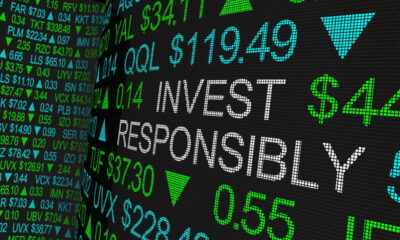

Features
‘Advisers can lead by learning about sustainable investing’
Anders Faijersson Ferguson, founding principal of Veris Wealth Partners, spoke with B> about sustainable investment and the part we all play in realising a blue and green future.
On the June 8, we were presented with the exciting news that 72% of financial advisers highlighted the sustainable investment sector as a growth opportunity. The report, entitled Gateways to Impact, predicted a market potential of $650 billion.
Among the report’s researchers, contributing financial support, expertise and guidance, was Veris Wealth Partners; a leading sustainable wealth management firm founded by Anders Faijersson Ferguson, which was dedicated to aligning families’ and foundations’ financial objectives with an overriding concept that “sustainability matters”.
“We opened our doors at Veris five years ago”, explains Ferguson, “and have been building our state of the art platform ever since.
“Over the last ten years it became clearer and clearer that there was an all-new emerging viewpoint on the intersection between sustainability and business performance, and that just made so much sense to me.
“Socially responsible investing had come a long way in 25 years, but we needed a more comprehensive approach and something that investors and business people could better understand to take the next big leap.”
Ferguson’s career has involved a variety of aspects in the sustainable business world. Beginning postgraduate life with a degree in environmental studies and history, he is now a principle consultant to Envestnet Sustainability Platform and the founding partner of Uplift Equity Partners, a global private equity fund investing in sustainable wellbeing. He also co-founded Spirit in Business and the Global Leaders Academy.
We asked how Ferguson began his career in the world of sustainable investment: “It simply made sense”, he says. “Beginning a long time ago; you could see that the world as we knew it wasn’t going to work very well if we continued on the path we were going.
“I resigned from a consulting company that I built in the ‘90s which was focussed on co-operative employee ownership and sustainability. In this, I had the opportunity to travel Tibet and China for three and a half months. It was while I was there that I had my own personal epiphany that as business leaders, in terms of the material world which was driving our lives, we had become collectively the new kings and queens of the active changing agent that was driving good and bad.
“It was a clear vision internally, that business people needed to start exploring what really drives us, and not just business people, people in NGOs, people in governments.
In 1999, the NGO (non-governmental organisation) Spirit in Business was founded. On the team was vice president of Innovest, Matthew Kiernan, who has commented on socially responsible beliefs in business – “Investing as if the future mattered”.
“In those days”, Ferguson says, “Innovest was using ESG (environmental, social and governance) factors very effectively. Together, we were testing the costs of excellence in management because managing these ESG sustainability factors drew better management and therefore we could determine better companies.
“I don’t think I was the only person around whose light bulb went off.
“It was really helpful to me. It made a lot of sense in all of the work that I was doing and informed my view on why it was important to create an independent wealth management firm in the United States, focussed on sustainable investing.”
Of the 1,065 financial advisers who took part in the comprehensive survey launched on June 7, 72% expressed some interest in recommending sustainable investments to their clients. William Crager, president of Envestnet, one of the study’s main sponsors, said, “Sustainability is not a fad. In fact, it has become an essential part of business performance and competitiveness.
“The business world is changing. The need for efficiency feeds innovation in sustainable practices that are designed to lower costs and protect future supply and distribution chains. This study shows that advisers can lead by learning about sustainable investing and sharing that information with their clients.”
Ferguson told B> how the research helped to build an innovative impact investment ‘platform’: “Envestnet provides technology and asset management for independent investment advisers like ourselves and other tens of thousands of advisers and we partnered to create a state of the art investment platform for financial advisers to access sustainable and impact investment products in a professional, easily accessible and professionally sourced way.
“We opened our doors in 2007 and a year later the entire economics system pretty much imploded. So we have been building our platform and firm during those critical years.
“Three or four years ago, Hope Consulting released a joint study which had some major implications over the investing side. This was funded by Rockefeller Foundation.
“The number one impediment they found was financial advisers and this is where, with our experience, myself and our managing partner took and interest.
“There has been some research on what consumers think about sustainable, socially responsible, and impact investing, but the whole idea of what financial advisers think, who are really so critical of the field, has really never been examined.
“To come back and see that two thirds of financial advisers already have some practice here or are looking at and curious about how to build their practice, was frankly a little stunning to all of us.”
There is an abundance of approaches to sustainable investing out there, but none as yet have defined the sustainability adviser so explicitly. Inspiringly, the strongest interest shown in the Gateways to Impact study, were from advisers practicing with less than ten years of experience, and women.
“We all believe that we have laid a new foundation”, says Ferguson, who has a clear view of what the next generation of investors will look like. “We have begun to establish a change of dialogue in the industry … new advisers and younger clients understand what a more sustainable business world will look like.
“They may own a Prius, they may be buying renewable energy, eating organic food or local food, buying fair-trade coffee or shopping at a company, even a global company, that is demonstrating a brighter commitment in these areas.”
Have a look at Blue & Green Tomorrow’s Guide to Sustainable Investment for more information about making your money make a difference.
Further reading:
Survey reveals promising trends in sustainable investment
Why the best financial advice includes ethical investment options
































